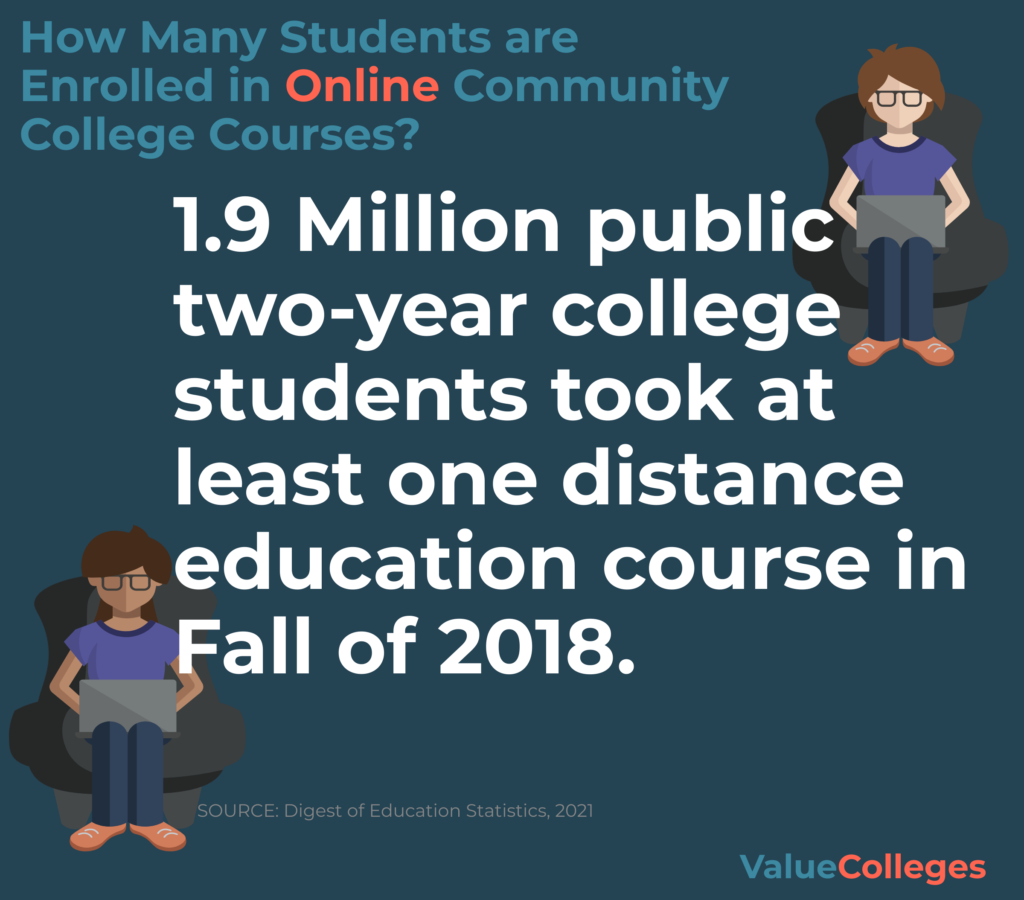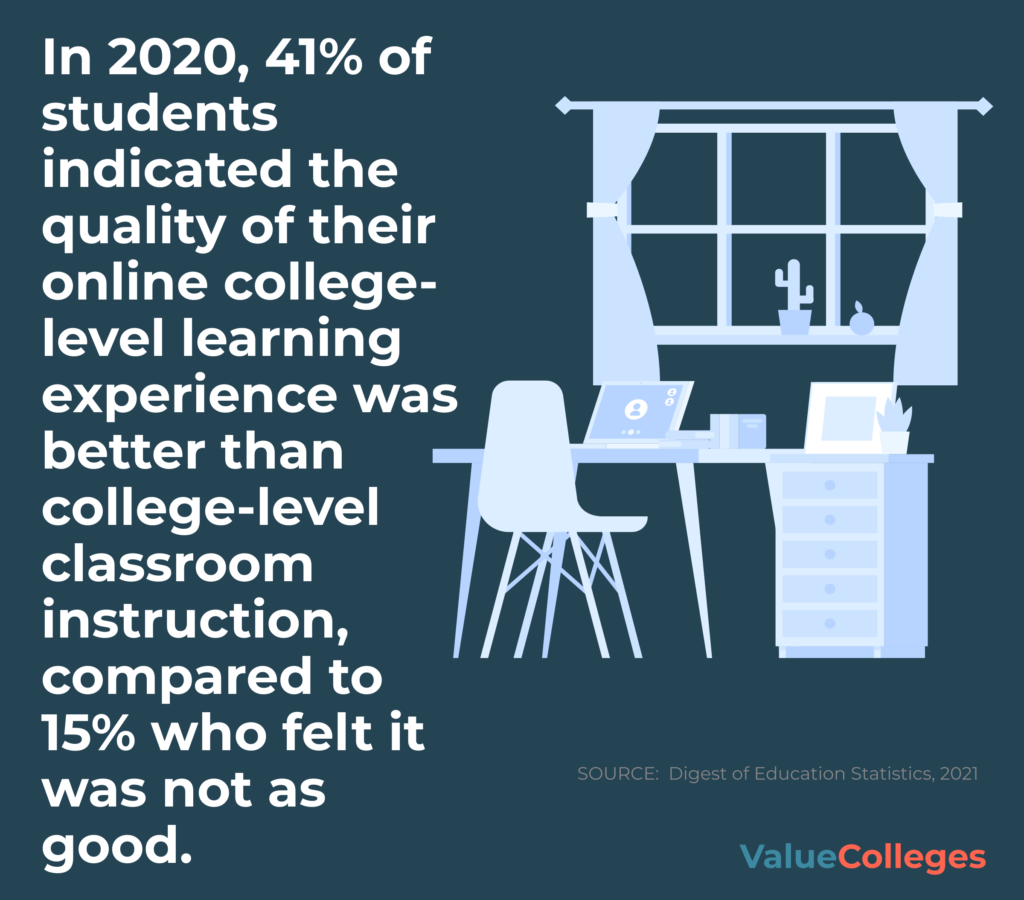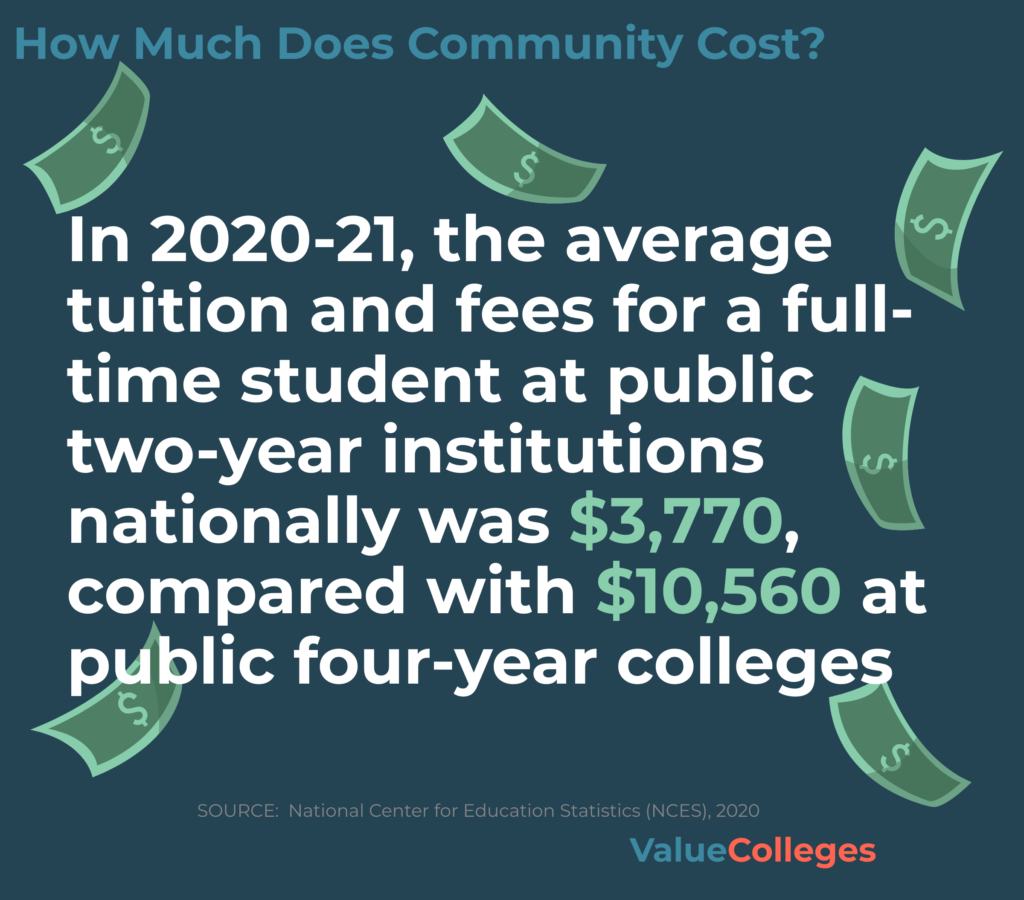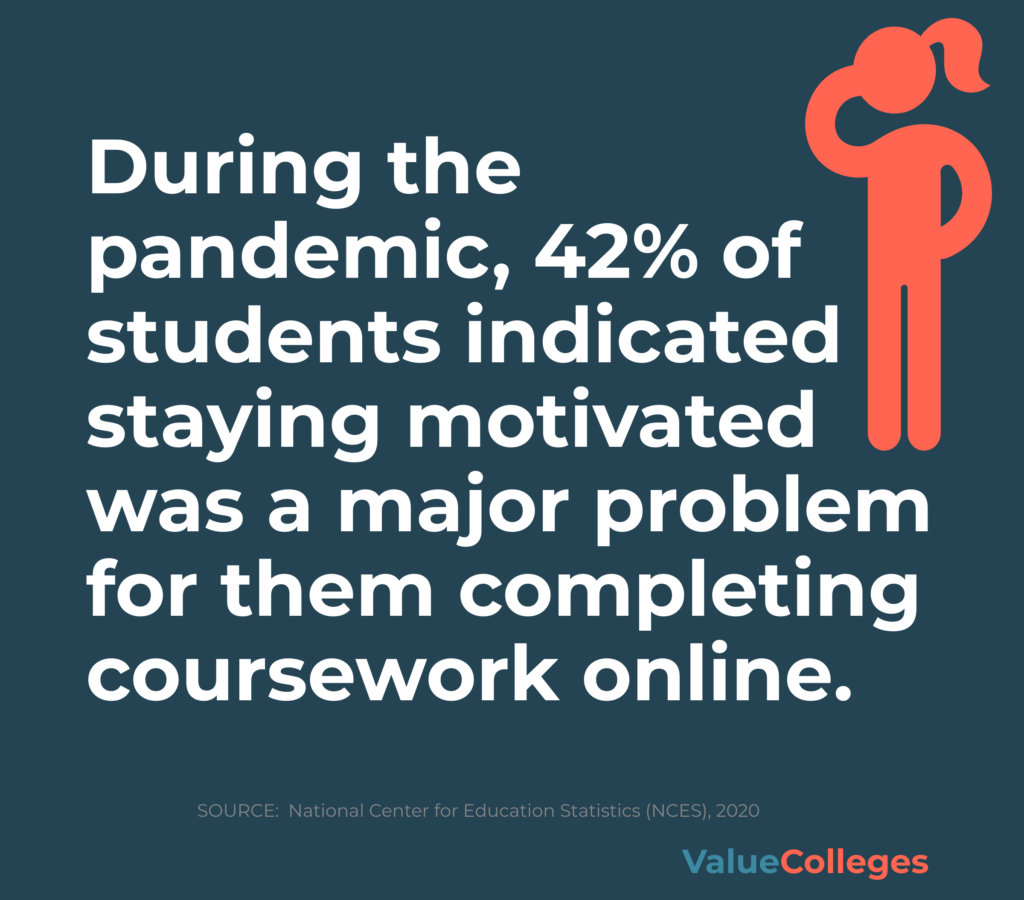Advantages to Choosing an Online Community College

Find your perfect value college
Changes in the workforce and job market over the last two decades have made online community college more important than ever. That’s especially true for working adults, rural and minority students, and other nontraditional students who want to get ahead. Online community college programs have the potential to fundamentally change American occupational and career education, so it’s time for Value Colleges to explore online community college.
Do Community Colleges Offer Online Degrees?
Yes, community colleges offer online degree programs for students seeking an associate’s degree or professional certificate. The online community college option makes getting higher education even more affordable due to the flexibility of attending classes and the elimination of the physical commute to the campus. Community colleges are already relatively inexpensive, and the online community college makes a low-cost education even more possible. An online community college program is identical to what a student would experience at an on-campus program, and the schoolwork requirements are the same. Degree programs at community colleges are always accredited which give students a quality education and better employment opportunities. Online community college programs offer students the same educational opportunities as on-campus, but with more convenience.
Featured Programs

Finding the best online community college is a matter of looking at the available options and each school’s reputation. Community colleges haven’t always been viewed favorably due to their restriction to offering associate degrees and certificates along with vocational programs. What many potential students miss is the fact that many regional community colleges have built up their campuses, facilities, and educational offerings to attract more students who wouldn’t thrive in a four-year school environment or want to save money on their graduate degrees. This focus has also translated into the creation of online programs to increase the reach of a community college to prospective students. Now a student who wants to attend a program at a community college in the state, but is not located within distance, can enter into that community college online degree program and gain access to the education they desire.
One often overlooked aspect of community colleges is that they have offered something known as CLEP testing for decades. CLEP, short for the College-Level Examination Program, is a type of test that allows students to earn college credit for courses they have existing knowledge and/or experience in. Prior to the advent of the internet, students used to check out videotapes, watch them at home, and take the test at the community college. What this means for someone looking to attend community colleges online is that community colleges have been offering remote learning for a very long time. In fact, students can still take CLEP tests to get credits completed more quickly, but the spirit of the CLEP test lives on with online community colleges. Community colleges do well for their students when it comes to offering online community college classes.
What are the Advantages of Online Community College Courses?
The major advantage of community college with online classes is the convenience. Students can live their lives as they need to and still attend classes for a community college course online. The classes themselves are available for the student to view on their computer, phone, or tablet which makes it easy to attend a community college course online anywhere there’s access to an internet connection. A student isn’t restricted to being in a specific location at a set time in order to attend class, especially when the demands of life are putting pressure on the student. Attending online classes for community college lets the student take care of their needs, whether it’s work or family, and attend the class at a time that’s convenient.
The saying of “time is money” is never more true when it comes to working and attending school. The primary reason to attend school is to improve one’s own potential for income, but sometimes a student needs to work to survive. A community college with online classes makes it easier for a student to earn a living while improving their employment prospects. Online community college courses eliminate the need to drive to campus and spend time in a classroom. The ability to attend online community college courses also lets a student attend full-time without giving up their job. It’s much easier to fit in the time for classes when given the opportunity to attend classes at times that are convenient to the student instead of a fixed time and location.
Another one of the driving reasons a student decides to go to community college is convenience. Just about every state has a community college that serves the entire county or a region in less populated states. A majority of community colleges are commuter schools. They don’t have dormitories for students to reside in while they’re attending school. Students who aren’t able to attend a four-year school are usually well-served by the local community college. They get to start their higher education, earn certificates that help them with entry-level employment, and sometimes take the opportunity to attend classes in other fields to find out if they like it or not. Taking a community college course online adds to the convenience level for students who have to put the more pressing needs of life first before their education.
As previously mentioned, classes and certificate programs offered at community colleges are accredited by their relevant accrediting body. The accreditation usually transfers to a community college online courses, or there’s another recognized accrediting body that qualifies the online classes. Ultimately, a student attending a community college with online classes can check the school’s website to determine if the course is properly accredited, and also research the accrediting organization to learn more about their educational standards. Accreditation assures the student, local, state and federal governments, and the public at large that the graduate has been taught to accepted standards for that particular field or practice. Students don’t have to be concerned about compromising their future employment by taking online community college courses as long as there’s accreditation.
Another reason why a student wants to make sure that a community college with online classes is accredited is employment. Schools offering online education during the early years of online college tended to be for-profit universities, didn’t focus on accreditation, and churned out students that weren’t as well-prepared for work as the schools claimed. Community colleges and universities alike were slow to adapt and adopt online community college courses due to the logistics and work involved in transferring on-campus classes to an online delivery format. In the meantime, employers were leery of accepting students who earned a degree at an online university that had a bad reputation. Many graduates found they had a much harder time finding gainful employment than their peers who attended schools in person.

Nowadays, employers won’t know if a student attended school physically or virtually. Online classes for community colleges have improved to the point that they’re indistinguishable from on-campus classes. A student who graduates from a reputable community college has the same employment opportunities as a student who attended classes on campus. Community college’s online courses are taught to the same standards, have the same curriculums, same homework requirements, and passing grades as the physical campus classes. Someone who takes online community college courses and graduates with their associate’s degree has the same credentials as a student who attended in-person.
The argument could be made for the elimination of physical campuses entirely, but there are benefits to being on-campus on occasion. Not every student thrives in a virtual classroom setting and needs the discipline of attending the campus. However, as more students adapt to the virtual community college setting, the more beneficial attending community college courses online becomes.
Are Online Courses as Good as Campus?
Yes, online courses are as good as attending the campus. Some students may have a harder time with self-discipline in terms of watching the classes and getting their homework completed on time. Those students may find it more advantageous to physically attend the community college, or engage in a hybrid program for a more flexible schedule. However, the in-person classes are broadcast live on the internet and recorded for later viewing by students taking classes online. What that means is that students get the same quality of education regardless of their in-person or virtual attendance. A good course is going to be good regardless of how the student chooses to attend.
Getting an education through a community college course online is serious business. Community college courses are almost always accredited in order to teach students how to do their work and learn in a way that’s accepted by local, state, and federal governments and the public at large. Therefore, students who take a community college online course are expected to attend and complete coursework the same as if they were attending school at a physical campus. The quality of education provided will meet the accreditation standards and act as a kind of insurance. A student can put faith in the quality of education and know that an employer will take their education seriously. It’s easy to find out about the accredited community colleges online as the school’s website will have information about the accrediting body for each program.
Taking classes and earning a degree online used to come with the perception that students didn’t get a standardized education from accredited schools. It’s true that, early on, unscrupulous private universities took advantage of students by providing an education that had little value or use in the working world. All of that has changed with a majority of schools adopting online education to reach more people and enroll more students. Employers won’t know if a student attended classes online or on-campus due to the degree coming from the same place. Someone with an online degree from a local and recognized community college has the same chance of finding employment as a student who attended their classes in person.

Will Online Community College Courses Transfer to a University?
It’s good to ask the question “do community college online courses transfer?” In general, online community college courses will transfer to a university as long as the community college and the university are in the same state. Some schools have a reciprocity agreement wherein a student who is taking classes at a community college can automatically transfer to a university after satisfactorily earning their associate’s degree. A total of 30 states have statutes that require credits from core classes to be guaranteed to transfer to another school and statewide guaranteed transfer of an associate degree to a university.
A statewide guaranteed transfer of an associate degree means that credits earned in a community college will automatically transfer to a four-year public college, enabling the student to start their classes at the junior level. As previously mentioned, only 30 states have specifically turned this matter into law and made it easier for students to make the decision to attend community college first. However, that doesn’t mean the remaining 20 states don’t have any law or regulation regarding the transferability of community college credits. Instead, these states encourage universities to accept core classes and/or all 60 credit hours for transfer students.
States without a guaranteed transfer statute tend to leave the decision to accept credits up to the universities. Most of the time, students can transfer their credits from a community college to a university in these states without encountering problems. Unlike a state with a guarantee, a student has to check with the school they intend to earn their bachelor’s degree about the transferability of credits. The student can’t rely on their credits automatically transferring to the university in these states, and some states may not allow all credits from an associate degree to transfer to a bachelor’s degree program.
Students who are interested in transferring their credits to a university should always check with the community college prior to attending. Credits are transferrable most of the time, but sometimes there are circumstances that will prevent the credits from being accepted by a university. State statutes usually only apply to community colleges and state universities, but private schools are usually accepting of credits earned at a public community college. Knowing the transferability of credits from a community college helps inform a student as to the actions they should take when deciding on their educational path. Higher education can be stressful; eliminating all potential sources of uncertainty before applying helps make the transition to a four-year school that much easier.

Do I Have to Go to My Local Community College?
No, you don’t have to go to your local community college if you don’t want to. A majority of community colleges are operated by the state government and don’t have residency requirements. The farther away you go from home for a community college, the more money you wind up spending. However, you can search the phrase “community colleges online near me” to find schools that are in the region that have online classes. Searching for “online community colleges near me” can also help you locate and identify community colleges in your state that offer an entirely online degree program that your local community college might not offer. Remember that you need to stick to community colleges in your area when searching “online community college near me”, especially if you live near a state border. You might find yourself getting results for community colleges in another state.
The biggest disadvantage you face as a student attending an out-of-state community college online is the cost. Some states charge triple the tuition they would charge an in-state student per semester. Consider the fact that community college costs around $4,000 a year for 30 credit hours, and it’s quickly apparent that the cost of attending an out-of-state community college is in line with attending a university. However, not all community colleges are that expensive for in-state students. The increase in cost at less expensive schools may be tolerable and still more affordable than attending a university.
Ask yourself why you’d like to attend a community college out of state before applying and spending the money on tuition. Are there online programs offered by the school that aren’t available to you in your home state? Or is there a degree program that has an affordable educational track that’s hard to find near home? Community colleges tend to be generic in the types of classes they offer due to the fact an associate’s degree is a relatively short program that has to pack a lot of education into a two-year timeframe. The education you receive from an accredited program at a community college in your state will have little variation from a similar program in another state. However, you may have a compelling reason to attend an out-of-state community college online that overrides all other considerations.
Nowadays, the only reason why a community college will ask about your residency is due to the cost of tuition for state residents and out-of-state students. Community colleges want to reach and enroll as many students as possible, and won’t turn down an applicant simply because they live outside of the state. Therefore, it’s very easy to enroll in an out-of-state community college that’s offering online classes. It’s always a good idea to contact the community college about attending from out-of-state prior to spending money on an application fee, but the chances are good that your non-resident status won’t impact your ability to attend a community college online.

Can I Get a Technical Degree Online?
Yes, there are some online technical degree programs that can be attended without ever setting foot on the campus. However, the available technical degrees online are ones that don’t require the student to be physically present to learn how to do the work. Students who want to take an online technical degree program should look into technical fields that include:
- Information in technology and networking
- Computer information systems
- Information technology management
- Software development
- IT certificates
- Manufacturing engineering technology
- Bookkeeping technology
- Criminal justice technology
These are just a few of the types of online technical degree programs available through online community college courses.
The term “technical degree” is one that covers a vast array of employment fields. While the fields listed above tend to focus on computer skills, there are many fields that are considered technical, but not computer-related. The healthcare field features many technical degrees that can be completed online through a community college. Engineering is another field that is considered a technical degree but doesn’t always require hands-on experience for students to learn. The amount of technical degrees available online is beneficial to students who want to start their career in as little time as possible, but have the opportunity to earn a decent wage.
Online technical degree programs offered through a community college also benefit students who intend to return to school at a later date to earn their bachelor’s degree. A student can opt to continuously take classes throughout the year in order to earn their associate’s degree sooner, find employment in their chosen field, gain real-world experience, then return to school and use the work experience to aid them in earning a bachelor’s degree. Some schools give students credit hours for work experience and can help a student save money on their higher education, earn a bachelor’s, and enjoy the financial rewards that come with having both work experience and a bachelor’s degree. Students who structure their education and work goals may find that earning their technical degrees online gives them a solid foundation that employers desire and are willing to pay for.
Students who are considering getting their technical degree online will find that there are many options available to them in terms of fields. However, some technical degrees are best learned when attending a class in person. Some types of technical fields require hands-on experience so a student can learn the feel, look, operation, and processes involved in that field. A student needs to make sure that the school they want to attend for a technical degree with an on-campus component is located within a reasonable distance from home for the occasional commute. Technical programs are often offered in a hybrid format in that many of the classes are offered online whenever possible, and the hands-on portions are held in-person at the campus. Students can still enjoy the benefits of online technical degree programs while getting the all-important hands-on experience they need for their employment.
Related Rankings:
- Top 50 Best Community Colleges
- Top 50 Best Value Online Community Colleges
- Top 50 Best Tech Schools
- Highest-Paying Community College Degrees
- Highest-Paying Tech School Degrees
Featured Programs
Aya Andrews
Editor-in-Chief
Aya Andrews is a passionate educator and mother of two, with a diverse background that has shaped her approach to teaching and learning. Born in Metro Manila, she now calls San Diego home and is proud to be a Filipino-American. Aya earned her Masters degree in Education from San Diego State University, where she focused on developing innovative teaching methods to engage and inspire students.
Prior to her work in education, Aya spent several years as a continuing education consultant for KPMG, where she honed her skills in project management and client relations. She brings this same level of professionalism and expertise to her work as an educator, where she is committed to helping each of her students achieve their full potential.
In addition to her work as an educator, Aya is a devoted mother who is passionate about creating a nurturing and supportive home environment for her children. She is an active member of her community, volunteering her time and resources to support local schools and organizations. Aya is also an avid traveler, and loves to explore new cultures and cuisines with her family.
With a deep commitment to education and a passion for helping others succeed, Aya is a true inspiration to those around her. Her dedication to her craft, her community, and her family is a testament to her unwavering commitment to excellence in all aspects of her life.